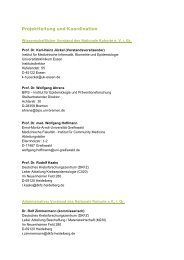Scientific Concept of the National Cohort (status ... - Nationale Kohorte
Scientific Concept of the National Cohort (status ... - Nationale Kohorte
Scientific Concept of the National Cohort (status ... - Nationale Kohorte
Create successful ePaper yourself
Turn your PDF publications into a flip-book with our unique Google optimized e-Paper software.
A.5 Methods for quality assurance and quality control<br />
The influence <strong>of</strong> temperature, storage time, preservatives and additives to <strong>the</strong> collection<br />
tubes, and repeated rounds <strong>of</strong> freezing and thawing on <strong>the</strong> sample quality will also be<br />
tested during <strong>the</strong> feasibility studies using appropriate and sensitive markers. To guarantee<br />
temperature stability over time, <strong>the</strong> temperature <strong>of</strong> all freezers will be documented daily. The<br />
number <strong>of</strong> stored aliquots and all deviations from <strong>the</strong> standardized protocol will be documented<br />
in a central database. Fur<strong>the</strong>rmore, a contingency plan will ensure sample integrity<br />
over <strong>the</strong> intended lifetime <strong>of</strong> <strong>the</strong> study, including storage solutions designed to assure that<br />
conditions are maintained (e.g., mechanical breakdown <strong>of</strong> <strong>the</strong> refrigeration plant, <strong>the</strong> robotics<br />
system, or <strong>the</strong> electrical supply).<br />
The procedure for sample aliquot retrieval will be established according to predefined criteria<br />
and follow specific SOPs. Fur<strong>the</strong>rmore, sample movements will be tracked and logged<br />
in a central database using <strong>the</strong> bar codes <strong>of</strong> each container.<br />
Deviations from any <strong>of</strong> <strong>the</strong> standardized protocols will be documented in <strong>the</strong> central database<br />
and <strong>the</strong>refore be readily available for examination by any unit involved in quality<br />
management.<br />
Novel technologies that arise during <strong>the</strong> recruitment or follow-up phases <strong>of</strong> <strong>the</strong> study will be<br />
tested in parallel with existing methods. Only if old and new technologies yield comparable<br />
data will we consider replacing existing methods.<br />
A subset <strong>of</strong> clinically relevant laboratory data will be provided to study participants within<br />
several weeks <strong>of</strong> <strong>the</strong>ir visit at <strong>the</strong> study center. Clinical parameters will be analyzed in certified<br />
laboratories associated with <strong>the</strong> study centers. Measurements between <strong>the</strong> clinical<br />
laboratories will be verified to determine interlaboratory variability.<br />
If necessary, <strong>the</strong> epidemiologic planning committee and competence units will define<br />
whe<strong>the</strong>r certain groups <strong>of</strong> participants will need to be excluded from <strong>the</strong> study. To identify<br />
appropriate exclusion criteria, specific questions will be included in <strong>the</strong> core questionnaire.<br />
A.5.6.2 quality control <strong>of</strong> biological specimens<br />
To monitor adherence to <strong>the</strong> SOPs, experts selected by <strong>the</strong> competence unit on biomaterials<br />
will visit <strong>the</strong> study centers at regular intervals. The competence unit is also accredited<br />
to authorize deviations from SOPs, if necessary. All study centers will be visited by external<br />
quality management once each year to ensure adherence to <strong>the</strong> SOPs and to certify <strong>the</strong><br />
examiners and technicians on site. Fur<strong>the</strong>rmore, <strong>the</strong> examiners und technicians will be<br />
retrained and recertified once per year to ensure adherence to <strong>the</strong> SOPs over time. If quality<br />
disparities are identified in biological samples collected by a certain individual, reasons<br />
which could explain such variation will be ascertained and used to retrain that particular<br />
technician. Newly hired personnel will receive <strong>the</strong> same training procedure as <strong>the</strong> core staff.<br />
Replicate measurements are used in a number <strong>of</strong> settings. During <strong>the</strong> feasibility and pilot<br />
studies, <strong>the</strong>y are used to test <strong>the</strong> impact <strong>of</strong> time and storage conditions on sensitive biomarkers<br />
and to test different verification procedures within <strong>the</strong> study centers or clinical laboratories.<br />
During <strong>the</strong> main study, replicate measurements are used to identify data errors.<br />
Replicate measurements will be appropriately documented and analyzed. Local accuracy<br />
checks will be used to detect missing, incorrect, interchanged, or nonclassifiable parameters.<br />
Interchanged or nonclassifiable biological specimens or parameter values will be discarded.<br />
Conspicuous values will be checked promptly and, if necessary, will be discussed<br />
with <strong>the</strong> clinical laboratory responsible for that particular value.<br />
The liquid handling equipment will be calibrated and inspected regularly to ensure accuracy<br />
and precision <strong>of</strong> <strong>the</strong> robotics procedures. The precision in preparing aliquots will be checked<br />
161<br />
A.5



